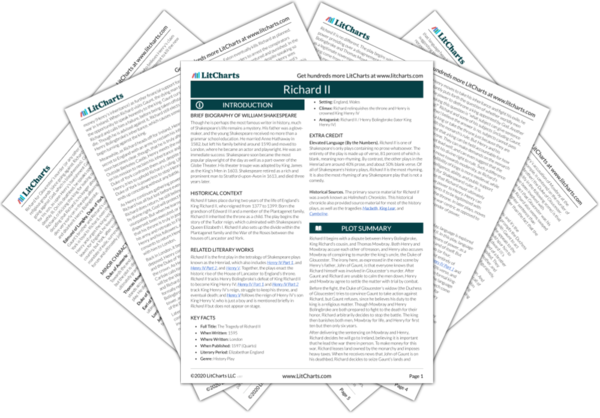Summary
Analysis
The play begins with King Richard, John of Gaunt, and other nobles entering the stage. Richard asks Gaunt if he has brought his son Henry, who is making an accusation against Thomas Mowbray. Gaunt responds that he has indeed brought Henry, and so Richard asks if Gaunt has asked his son whether the accusation is legitimate or merely based on an old grudge. Gaunt says that Henry sees Mowbray as dangerous and believes he is a threat to king. The quarreling men are then called forward to discuss the accusations publicly in front of the king.
At the start of the play, Richard II is firmly in power on the English throne. We are also introduced immediately to family tensions, as Henry is Gaunt’s son, and to questions of honor, as the dispute between Henry and Mowbray is the subject matter that opens the play. From the beginning, it’s unclear whether these accusations are genuine, or merely attempts to appear more honorable.
Themes
Both Henry and Mowbray praise Richard before beginning to accuse one another. Henry, who is prepared to die for this cause, swears on his honor that Mowbray is a traitor. Mowbray responds by asserting his own honor and innocence, and by saying that Henry is in fact a traitor and a liar. At this Henry throws his gage (glove), a gesture that marks an official challenge. Mowbray then picks up the glove, officially accepting this challenge.
With Richard still firmly in power, part of appearing honorable is praising him. Both men swear on their honor, which is a life and death matter. Though the debate begins in the realm of language, the official gesture of throwing the gage begins to transfer it into the realm of battle, violence, and action.
Themes
Literary Devices
Again, Henry says that he is willing to prove his truth in battle. At Richard’s request, he gives more details of his accusation: Henry says that Mowbray has committed numerous treasons for eighteen years, and more specifically was involved in the murder of the Duke of Gloucester.
Henry emphasizes again that he is willing to die for his honor, and that what’s true according to language can be supported or confirmed by action (battle). As will become clear in act 1 scene 2, the dramatic irony here (which Shakespeare’s audience would have known) is that Richard himself was involved with Gloucester’s death.
Themes
Literary Devices
Mowbray then attempts to make his own case, noting that Richard and Henry are cousins. Richard, though, says that he is ever impartial, and vows that Henry will not receive special treatment just because he is near to the king’s “sacred blood.” Mowbray then continues to make his own case, in which he also says he is willing to undergo trial by combat to settle the matter. He says that Henry is a liar and that he didn’t murder Gloucester, though he was negligent in preventing the attack. He also admits to laying an ambush for Gaunt, but says that he has already confessed and repented for this crime, and he maintains that Henry’s accusations are baseless. The king and John of Gaunt try to calm Henry and Mowbray down, but the two men are too heated and too desperate to preserve their honor and reputation to back down. Richard then decrees that the two will fight a trial by combat.
Richard introduces the dual symbolism of blood, as it indicates both Henry’s close familiar relationship to the king, and the royal, divine lineage of their family. Mowbray, like Henry, continues to emphasize that he will die for his honor (or to keep up the appearance of being honorable), and that he’s willing to back up his verbal claims with actions. Though Gaunt and Richard attempt to use language to calm the accusers and intercede, ultimately the king decides language is insufficient to settle the debate. Instead, he decrees that the two men will do as they have offered, and settle it with a trial by combat.
Themes
Literary Devices
Get the entire Richard II LitChart as a printable PDF.













